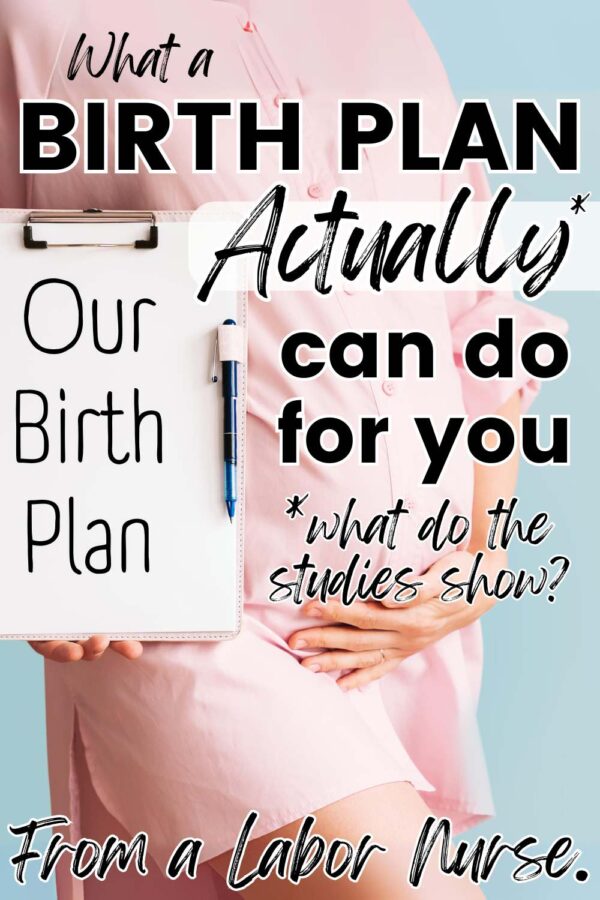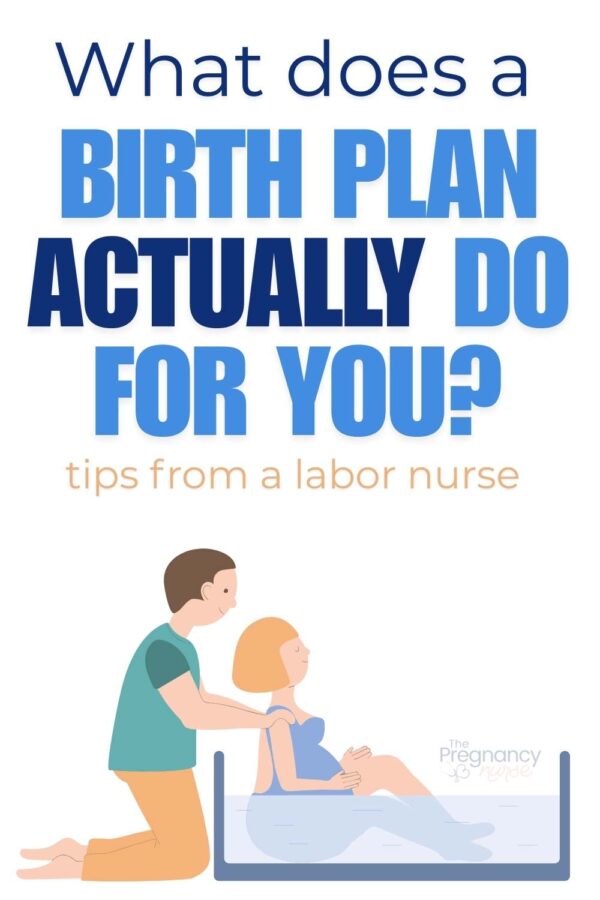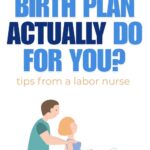👋 I’m so glad YOU are here. Are you looking to also get your partner prepared? This is for BOTH of you. Couples just love it and I know you want to both feel prepared!
Birth plans are all the rage. Sure, I prefer birth preferences or birth wishes, but the idea is the same. Your hopes and dreams from a birth in a perfect world. BUT, is this effort actually going to improve your birth? Will you ultimately have a better outcome? What do the studies show?
Before we get started I do agree there are completely wrong and right ways to make a birth plan… get my best tips to make YOUR birth plan (plus a free printable to do it) right here:
Honestly, I hadn’t seen a lot of studies about what a birth plan does, so I was really excited to see this one.
Source: Naaz Shareef, Naomi Scholten, Marianne Nieuwenhuijze, Claire Stramrood, Marieke de Vries, Jeroen van Dillen, The role of birth plans for shared decision-making around birth choices of pregnant women in maternity care: A scoping review, Women and Birth, Volume 36, Issue 4,

It identified 5 ways that a birth plan can help — let’s define those a bit:
Shared Decision-Making
This is another way of saying informed consent, or just getting the information from your provider and then you making the ultimate choice surrounding your birth.
Why would this be?
I think it’s because you have told the providers you want an active role in making choices. For those of you reading this article, you might be shocked at the MANY people who come to the hospital and really just want providers to make choices for them.
Your birth plan shows us you’re prepared and you want to be a partner in this process. It’s honestly exciting for us to hear that — most birth workers REALLY want that!
Want to know more information on informed consent — check out these posts:
- Why is Informed Consent Important?
- 5 Things Your Provider Should Get Consent For During Labor
- Advocating For Yourself in Labor
Autonomy
This means you feel like the birth is yours, and you’re driving the bus (and making the choices). We all like to feel autonomous. For me, personally, I feel like an adult when I’m working with autonomy — because I’m in charge.
Why would this be?
I think often people don’t realize all the choices that there ARE in labor – so, when you’ve thought about them in advance, that’s a big win.
Again, you’re also showing us you do want to make those choices — so, you’re able to!
Sense of Control
Again — people feel like they are making the choices and have some control in something that is entirely uncontrollable.
Why would this be?
I really think that when you have a properly-prepared birth plan, you realize that you don’t control everything, but you realize that there are aspects that you can control.
Similar to like a toddler where you’re asking them if they want the red cup or the green cup, it helps them feel in charge, even though they can NOT have the pink cup (because it’s in the dishwasher).
In this choice you get to decide what you’re wearing, but you can’t decide that your water happened to break at home a bit early.
Want to know more about control in labor — check out these posts:
- 5 Things You CAN Control in Labor (mostly)
- Pitocin to Induce Labor
- The MOST Traumatic things in Labor & Delivery
Professionalism of the Care Provider
People seemed to think that their team was more professional. This is awesome, and something I think a lot of people want.
Why would this be?
Honestly, I think this is because you’ve hopefully done your research in advance, you’re educated and prepared to BE professional in the labor setting. When you come as a professional, we come as a professional too.
When you’re nervous and you take it out on us (by yelling or being disrespectful) we tend to be less-professional, even if we should try hard not to.
Want to know more about providers in obstetrics — check out these posts:
- The Best Providers for Your Baby’s Arrival: A Deep Dive with CNM Juli Pyle
- Picking Your Pregnancy Healthcare Provider
- Tips To Saying No To Your Provider
- The Benefits of a Midwife
Soapbox: Often I hear people saying they have an issue with something like a cervical exam, or IV’s because they have personal issues surrounding that area. The professional thing to do would be to handle that with a therapist, rather than plan on the hospital staff dealing with your issues. While we all have our issues being mindful of what’s a “you” thing and what’s an “us” thing can help! I talk about this more in this video:
Trust
These people trusted their healthcare team more (which is awesome).
Why would this happen?
I think it would be that each action shows that you’re in charge, and we’re checking with you before doing something. You’re showing us you want that — and we’re giving it to you (likely, gladly).

Other Studies on Birth Plans:
After looking at that article, I looked to see what other things I found:
This one showed there was no difference in either experience or outcome.
This review showed less cesareans and better birth experiences.
Here’s a few other things I found in that review
Source: Kohan S, Hajihashemi M, Valiani M, Beigi M, Mohebbi-Dehnavi Z. Maternal-infant outcomes of birth planning: A review study. J Educ Health Promot. 2023 Sep 29;12:315. doi: 10.4103/jehp.jehp_1450_22. PMID: 38023070; PMCID: PMC10670885.
- Less epidural use
- More likely to initiate breastfeeding in the birth room
- Babies had similar outcomes compared to those without one (it didn’t do anything bad).
- More likely to have a small tear
- Less Likely to have a cesarean section
- More likely to have an epidural (studies are tricky like this — one of the studies showed this, which I thought was interesting)
- Combined with a birth class you can decrease cesarean rates
As you can tell a lot of these contradicted themselves, and often a study can be made to “prove” whatever it is what you’re hoping for.
My Experience With Birth Plans as an L&D RN.
While studies are amazing, what do bedside nurses see about birth plans.
I think that birth plan creators run in two camps:
- People who are MARRIED to this birth plan, and believe that by writing it down it will happen.
- People who have just put down their hopes and dreams, but are willing to flex as needed.
Personally, those in group one (married to it) I haven’t seen the best outcomes. They’re trying to control something that is entirely uncontrollable and they’re unwilling to be flexible. Often they get a dose of the uncontrollable the more they try to control things — again — this is just my experience. I really want that birth plan too!
Sometimes their poor outcome is also based on them mourning the birth they thought they could have vs what did happen. Maybe poor expectations vs what the reality was created trauma for them. That’s something that can be prevented in advance (and we’ll talk more about that).
Want to know more about birth trauma — check out these posts:
- 4 Ways to Prevent Birth Trauma Before, During or After Birth
- Preventing Birth Trauma
- How to Prevent a Poor Birth Experience: Prenatal prevention of birth trauma
- 3 Ways to Prevent Birth Trauma: Make your birth amazing with a few mind shifts!
- What To Do If Your Labor Goes Long?
However, people in group two (the flexible ones) tend to have better outcomes (and a better experience overall). These patients…
- Have thought about labor and what they’d prefer if given the option
- Flexible and know that they really don’t have control over all the things
- Hopefully have talked with their provider about their hopes and wishes about their upcoming birth.
Sharing your birth plan early and often with your provider (doctor or midwife) is one of the most important things I go over in my birth plan series. Learning how to integrate it into your regular prenatal care is so important (and smart)!
The reality is that you need some education, AND a birth plan. It’s really not just a check sheet on what you want, it’s being informed on what the choices are/could be.
Sometimes taking a “birth class” can feel really overwhelming and like it’s just too much.
I get that feeling. I get overwhelmed really easily, and birth is a BIG topic. Which is why I created something that would not overwhelm you, but WOULD get you prepared.
The Online Prenatal Class for Couples is just that. I’ll educate you on your options and show you what types of interventions are common, so you’re not caught off guard frequently in your upcoming hospital birth. PLUS we also help you get prepped for postpartum — which is an area a lot of people miss!
If you’re thinking I just want to make a good birth plan, I also can help you with that:








 What Does a Faint Line on a Pregnancy Test Mean?
What Does a Faint Line on a Pregnancy Test Mean?
